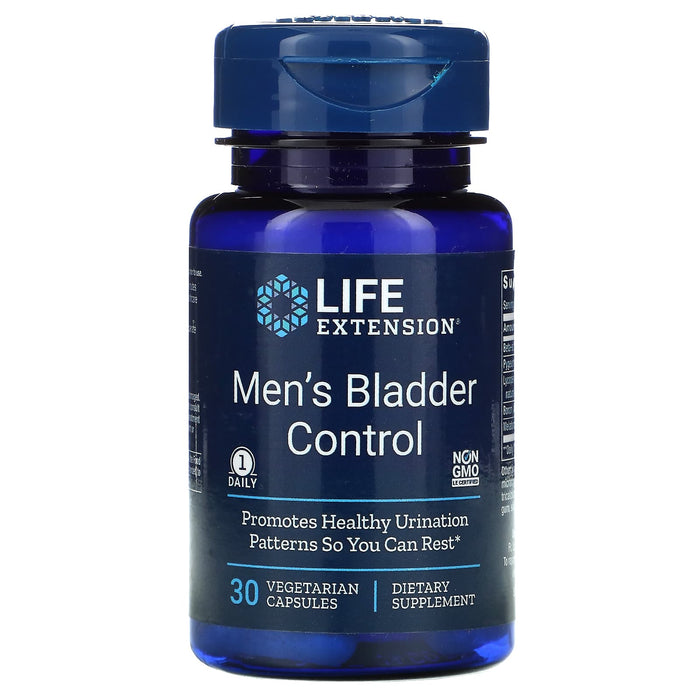




| Serving Size: 1 Vegetarian Capsule | ||
| Servings Per Container: 30 | ||
| Amount Per Serving | % Daily Value | |
| Beta-Sitosterol |
180 mg | ** |
| Pygeum extract (bark) |
100 mg |
** |
| Lycopene [LycoBeads® from natural tomato extract (fruit)] |
15 mg |
** |
| Boron (as Albion® bororganic glycine) |
10 mg | ** |
| Melatonin |
2 mg | ** |
| **Daily Value not established. | ||
Support urinary health with Men's Bladder Control by Life Extension, a supplement for men's wellness.
Men's Bladder Control is a science-based supplement that promotes healthy male urinary patterns and restful sleep. This formula combines melatonin, beta sitosterol, and lycopene to help relieve nighttime urinary urges, as demonstrated in a clinical study where men experienced benefits after taking one capsule before bed.
Read the entire label and follow the directions carefully prior to use.
Take one (1) capsule daily, 60 minutes before bedtime, or as recommended by a healthcare practitioner.
Vegetable cellulose (capsule), microcrystalline cellulose, vegetable stearate, tricalcium phosphate, maltodextrin, alginate, acacia gum, silica.
At Health Orchard, we are committed to providing accurate product information and images. However, manufacturers may update their product packaging or ingredients, and these changes may not be immediately reflected on our website. It's possible for products to be shipped with different packaging than what is shown online. For the most accurate and safe use of any product, we advise reading the product's label, warnings, and instructions rather than relying solely on the details provided by Health Orchard.
The best treatment for bladder control issues can vary depending on the underlying cause and severity of the problem. Treatment options may include lifestyle changes (such as fluid management and bladder training), pelvic floor exercises, medications, and in some cases, minimally invasive procedures. Supplements like those offered by Life Extension may also play a supportive role in managing bladder control.
Improving bladder control for men often involves a combination of approaches. These can include pelvic floor exercises (Kegels) to strengthen the muscles that support bladder function, lifestyle modifications such as limiting caffeine and alcohol intake, and maintaining a healthy weight. Bladder training techniques, which involve urinating on a schedule, can also be effective.
Several natural supplements have been associated with supporting bladder control. These may include pumpkin seed extract, which may support prostate health and urinary function, and saw palmetto, which is often used for prostate health. Other potentially beneficial ingredients might include beta-sitosterol, pygeum, and certain amino acids.
Loss of bladder control in men can have various causes. Common factors include an enlarged prostate (benign prostatic hyperplasia), weakened pelvic floor muscles, neurological conditions, certain medications, and lifestyle factors such as excessive caffeine or alcohol consumption. Age-related changes in bladder function and capacity can also contribute to urinary control issues.
While complete cure may not always be possible, many cases of urine leakage in men can be significantly improved or managed effectively. The potential for improvement depends on the underlying cause and severity of the condition. With appropriate treatment, which may include lifestyle changes, exercises, medications, or in some cases, surgical interventions, many men experience substantial reduction in urine leakage and improved quality of life.
Early signs of male incontinence can include occasional leakage when coughing, sneezing, or during physical activity (stress incontinence). Men might also experience a sudden, intense urge to urinate followed by involuntary leakage (urge incontinence). Other signs can include difficulty starting urination, a weak urine stream, or feeling like the bladder doesn't empty completely.